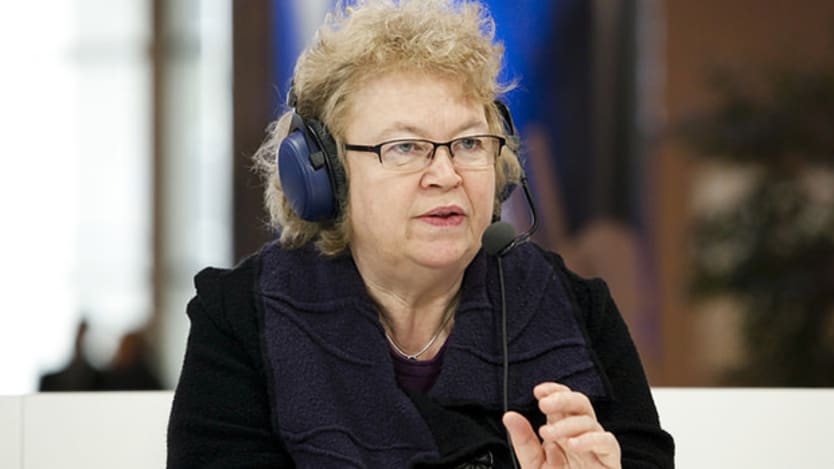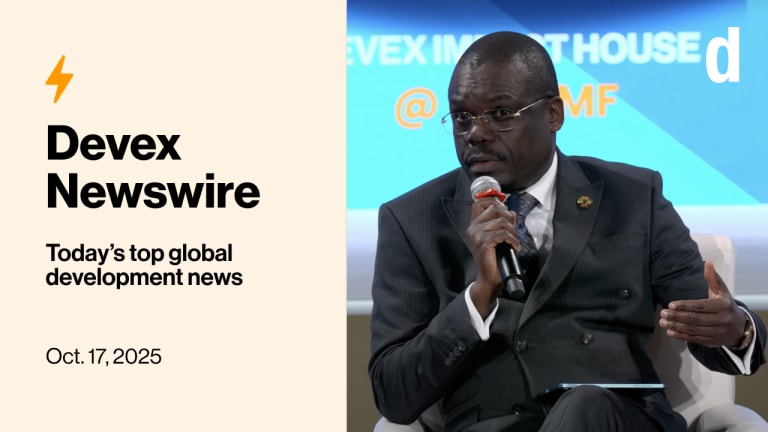
2015 is the European Year of Development, looking ahead to the new sustainable development goals and an appropriate time to consider the future of development policy and how it is delivered.
Charity may begin at home, but it doesn't have to end there: The United Kingdom is in a position to lead by example and play an important and significant global role in international development.
Recent legislation to ensure that at least 0.7 percent of gross national income should go to development is a case in point — and should be welcomed.
There is talk of reform at the U.K. Department for International Development. Whatever its future, its remit should always be to act in a manner that is both sustainable and just.
Certainly, some of the new elements of working “smart” and keeping the end-goal in perspective — rather than letting process rule content — sound encouraging. Of course, to realize global ecological sustainability, with equity and social justice at the center, the European Union and other industrialized countries must actively reduce their own consumption, waste and pollution — thereby encouraging other countries to adopt development strategies that are truly sustainable.
The United Nations adopted a Millennium Declaration 15 years ago, followed by the setting of targets that should have been achieved this year. The eight Millennium Development Goals have been a milestone in development efforts. The framework has helped to galvanize and guide global and national development priorities, in an effort to concentrate resources and improve outcomes.
The European Commission communication “A Decent Life for All” supplied the context in which the EU position on the post-2015 agenda should be considered. It called on EU member states to confront wide-reaching global concerns, such as security, poverty, education, gender equality, decent work, sustainable energy and inequality. And that’s not the entire list.
It also said that the post-2015 framework should be able to secure a rights-based approach, addressing justice, good governance, democracy and the rule of law, peaceful societies and freedom from violence.
In reference to the post-2015 agenda, we should be considering what, if any, place the private sector has in delivering future goals. Aid resources are declining, so policymakers require significant financing beyond that able to be supplied through public funds.
Typically, this lays the groundwork for the private sector to convince donors that they can demonstrate value-for-money to taxpayers, while bringing expertise. Typically, too, the global development charities strive for long-term development work primarily through working with local organizations and partners.
The U.K. is not alone in seeing pressure brought to bear on development policy to link trade and aid: This usually means pushing contracts toward donors’ domestic companies, rather than developing local economies in recipient countries, or even undermining those local economies. This means that currently the debate is positioned as whether the private sector should become a development actor, and whether that is even desirable.
For example, we cannot ignore that Africa is producing more and more food — while hunger has not abated. Global corporations are scrambling to take control of Africa’s food while small-scale farmers who feed most of the continent are overlooked. This illustrates one of the main arguments against: Private investment is almost always based on the principle that growth and trade are the main drivers of development.
Where is the room for redistributive policies within that?
I want to lay out three development principles, and provide comment both on why they can work, but why they cannot be considered stand-alone solutions:
1. Greater focus on “small expert” NGOs, prioritizing the real experts.
Locally led NGOs in the developing world are the ultimate guarantors of sustainability and accountability, since they are finding solutions for their own communities. As attractive as this sounds, it can only be part of an integrated solution: DfID already supports funding to a number of these through partnership programs, but not all small and on-the-ground NGOs have the required capacity to really deliver substantive work at scale — so they need support.
2. Working in parallel with governments is not the solution.
There is a need to work in partnership — not in parallel — with governments to strengthen their institutions.
Of course, this doesn't mean you simply hand over cash or control. Complexities arise when the government wants program change to simply achieve their own, not necessarily desirable, ends — for example, a vanity project in the prime minister's hometown, or to switch funding from an agreed program to cover a budget hole elsewhere!
It’s also a reason why it is important to set up essential requirements of procurement systems — so that a foundation for longer-term reform is established and corruption diminished. Development agencies must have clear checks in place so that public development finance is channeled into supporting local economic networks in developing countries, not diverted to promote private businesses and multinationals from the donor countries.
In particular, the capacity of domestic micro, small and midsize enterprises should increase.
3. The U.K. government should scrutinize the impact of its entire policy package on development to achieve coherence.
All too often our trade policies undermine local markets, which means that much of our work on livelihoods is undercut. From a U.K. point of view, at the very least the next government must make sure that U.K. companies respect people’s rights and move away from a position of “voluntary” corporate social responsibility toward fully supporting mandatory international standards.
Development work is also facing the growing issue of governments being able to claim that they have “other friends” if you want to insist on gender equality, anti-poverty, human rights or other “inconvenient” things. Broad questions remain about how to engage with administrations that have, for example, anti-LGBT laws, practice the death penalty, etc., and this cannot depend on national development policy alone.
DfID plays an integral role in international development, and its importance shouldn’t be understated: It is a positive part of our national image abroad.
We all want and deserve a world that is more equal — DfID has the resources, ability and expertise to help bring that about.
Stay tuned for more U.K. election coverage and news, views and analysis on how this impacts DfID and U.K. aid in the coming weeks. To explore additional content, visit the Future of DfID series site, follow us on Twitter and tweet using the hashtag #FutureofDfID.
Read more on the #FutureofDfID:
● UK #GE2015: The moment of truth for DfID?
● DfID to increase trade role in future — Greening
● As long as there's extreme poverty, there's a need for DfID
● Labour MP: DfID has 'lost its way' under Cameron
● DfID is changing — but is it changing fast enough?
● Debate on the future of aid ‘makes me worry’
● Time to recognize private sector role in UK aid








